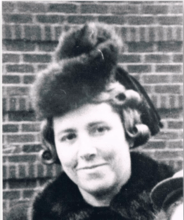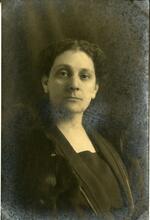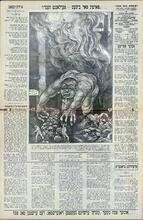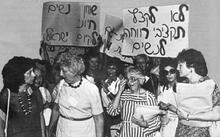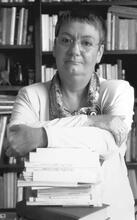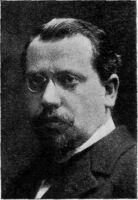Rebecca Fischel Goldstein
The quintessential rebbetzin [rabbi’s wife], Rebecca Fischel Goldstein was a prime mover in her husband’s drive to build the Institutional Synagogue and make it a center of Jewish life in Harlem. Born in New York City in 1891, Goldstein used her community skills to reach out to the young, emphasizing education. As a consummate volunteer leader, she strove to make women a dominant force in organized Jewish life, helping to found the Women’s Branch of the Union of Orthodox Jewish Congregations of America, the Women’s League of the Institutional Synagogue, the Hebrew Teacher’s Training School for Girls, and the Yeshiva University Women’s Organization.
The heading of the New York Times obituary of June 5, 1961, for Rebecca Fischel Goldstein read, “Mrs. H. S. Goldstein, Rabbi’s Wife.” This truly reflected who Mrs. Rebecca Goldstein was. The quintessential (Yiddish) Rabbi's wife; title for a learned or respected woman.rebbetzin [rabbi’s wife], she was a prime mover in her husband’s drive to build the Institutional Synagogue and make it a center of Jewish life in Harlem. As a consummate volunteer leader, she strove to make women a dominant force in organized Jewish life, helping to found the Women’s Branch of the Union of Orthodox Jewish Congregations of America, the Women’s League of the Institutional Synagogue, the Hebrew Teacher’s Training School for Girls, and the Yeshiva University Women’s Organization.
Early Life and Family
Rebecca Fischel was born in 1891 in New York City, the second of four daughters born to philanthropist Harry and Jane (Braz) Fischel. A real estate developer who had emigrated penniless from Russia as a young man, Harry Fischel was determined to provide his children with the finest education. His unyielding devotion to the Orthodox Jewish tradition, to which he attributed his material prosperity, led him to provide home-based Jewish schooling for his daughters. To ensure their success in the secular world, Harry Fischel sent all four girls to college.
While attending Barnard College, Rebecca met Herbert Goldstein, then studying at Columbia University. After graduating in 1912, she continued her studies at the Teachers Institute of the Jewish Theological Seminary. The two married on March 1, 1915, brought together by their immersion in the study of Jewish texts and their determination to teach others and spread the word of Torah she-bi-khetav: Lit. "the written Torah." The Bible; the Pentateuch; Tanakh (the Pentateuch, Prophets and Hagiographia)Torah. To illustrate the ideal they had set for themselves before their marriage, they decided to produce an ethical work as a wedding souvenir. They chose to translate and publish the La-Yesharim Tehillah [Praise to the Righteous], written in Amsterdam by Moses Hayyim Luzzatto in 1743.
Role in Orthodox Judaism
When her husband founded the Institutional Synagogue in 1917, Goldstein was by his side, supporting his Jewish revival movement and his dream of an institution that would serve as synagogue, Hebrew school, and community center for the Jews of Upper Manhattan. While he nurtured the spiritual needs, Goldstein used her community skills to reach out to the young, emphasizing education. Even while raising their own four children—Simeon, Gabriel, Josephine, and Naomi—she founded the Daughters of the Institutional Synagogue, and became a mother figure to countless young women.
Outreach and education were central themes in Goldstein’s life. As the first president of the Women’s Branch of the Orthodox Union she established the Collegiate Branch to spread Torah to college students. She was a vice chair of the Women’s Committee of the Rabbi Isaac Elchanan Theological Seminary, which achieved its goal of raising $250,000 for the building of the first student dormitory at Yeshiva University in 1927.
Rebecca Fischel Goldstein’s greatest gift was her ability to inspire leadership and Jewish commitment in others. Even after severe arthritis forced her into a wheelchair in 1947, she continued speaking and motivating women to become involved in a meaningful Jewish life. Her legacy of courage and passion are reflected in these words: “To believe we must feel, to feel we must understand, to understand we must study … [there is] no royal road to instilling religion without study.”
AJYB 63:559.
NYTimes, June 5, 1961, 31:2.
Reichel, Aaron I. The Maverick Rabbi (1984).
Reichel, Josephine Goldstein. Private collection.
WWIAJ (1926, 1928).


